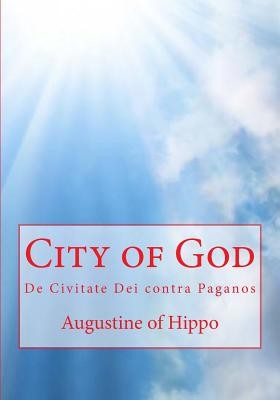
- Išsiųsime per 10–14 d.d.
- Autorius: Augustine Of Hippo
- Leidėjas: Limovia.Net
- Metai: 2013
- Puslapiai: 802
- ISBN-10: 1783362464
- ISBN-13: 9781783362462
- Formatas: 17.8 x 25.4 x 4 cm, minkšti viršeliai
- Kalba: Anglų
- Extra -25 % nuolaida šiai knygai su kodu: ENG25
Atsiliepimai
Aprašymas
The book presents human history as being a conflict between what Augustine calls the City of Man and the City of God, a conflict that is destined to end in victory of the latter. The City of God is marked by people who forgot earthly pleasure to dedicate themselves to the eternal truths of God, now revealed fully in the Christian faith. The City of Man, on the other hand, consists of people who have immersed themselves in the cares and pleasures of the present, passing world. Though The City of God follows Christian theology, the main idea of a conflict between good and evil follows from Augustine's former beliefs in Manichaeanism. A philosophy based on the idea of primordial conflict between light and darkness or goodness and evil. In the case of City of God, it is the City of God (representing light) and the City of Man (representing darkness). Though his book follows an ideology of Manichaeanism, he still distances himself from them by calling them heretics: "... I say, so just and fit, which, when piously and carefully weighed, terminates all the controversies of those who inquire into the origin of the world, has not been recognized by some heretics ..." Later, when Augustine converted to Christianity he at one point accepted Neo-Platonism. He ends up adding an idea of Neo-Platonism with a Christian idea in The City of God when he says: "As for those who own, indeed, that it was made by God, and yet ascribe to it not a temporal but only a creational beginning ..."
EXTRA 25 % nuolaida su kodu: ENG25
Akcija baigiasi už 1d.15:07:25
Nuolaidos kodas galioja perkant nuo 10 €. Nuolaidos nesumuojamos.

- Autorius: Augustine Of Hippo
- Leidėjas: Limovia.Net
- Metai: 2013
- Puslapiai: 802
- ISBN-10: 1783362464
- ISBN-13: 9781783362462
- Formatas: 17.8 x 25.4 x 4 cm, minkšti viršeliai
- Kalba: Anglų Anglų
The book presents human history as being a conflict between what Augustine calls the City of Man and the City of God, a conflict that is destined to end in victory of the latter. The City of God is marked by people who forgot earthly pleasure to dedicate themselves to the eternal truths of God, now revealed fully in the Christian faith. The City of Man, on the other hand, consists of people who have immersed themselves in the cares and pleasures of the present, passing world. Though The City of God follows Christian theology, the main idea of a conflict between good and evil follows from Augustine's former beliefs in Manichaeanism. A philosophy based on the idea of primordial conflict between light and darkness or goodness and evil. In the case of City of God, it is the City of God (representing light) and the City of Man (representing darkness). Though his book follows an ideology of Manichaeanism, he still distances himself from them by calling them heretics: "... I say, so just and fit, which, when piously and carefully weighed, terminates all the controversies of those who inquire into the origin of the world, has not been recognized by some heretics ..." Later, when Augustine converted to Christianity he at one point accepted Neo-Platonism. He ends up adding an idea of Neo-Platonism with a Christian idea in The City of God when he says: "As for those who own, indeed, that it was made by God, and yet ascribe to it not a temporal but only a creational beginning ..."




Atsiliepimai